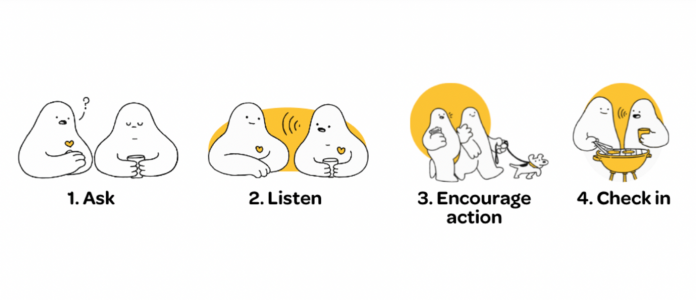You don’t need qualifications to check in with a friend. Most people may think that it should be an expert that checks in on someone who is struggling, but it can be hard to reach out and sometimes all a person needs is for someone to listen. With the struggles of the ongoing pandemic, natural disasters, and general personal stressors, it’s becoming increasingly important to look out for our loved ones.
R U OK? Day is here to remind Australians that you don’t have to be an expert – all you have to do is ask and listen. If you think someone may be going through a rough period, it may be time for you to ask, “are you okay?” and check in with them. Some common signs that someone is struggling include:
- Low moods
- Sleep problems (they might be sleeping a lot more, or much less)
- Self-isolation
- Loss of interest in things that they once loved
- Reckless behaviour
These are just some of the many signs, and they can vary, or be subtle. If you’re worried about a loved one, but they are not showing any clear signs of struggling, trust your gut instincts and check in on them.
Asking “are you okay?” entails just four simple steps.
- Ask the question
- Listen (with an open mind)
- Encourage action
- Check in
Once you ask the question, be sure to prepare to listen. If your conversation partner seems hesitant to open up, you could try some prompting questions like “what’s been happening?” or “is there someone else you can talk to?”. If they are happy to talk to you, ensure you are listening genuinely, non-judgmental, and patient.
Step three is where you can offer further support or encourage them to take action. Ask questions like “what can I do to support you?” or “have you thought about seeing a doctor?”.
Once you’ve completed all the above steps, make sure that you don’t leave it there. Check in once again a few weeks later (or sooner if you’re still concerned) to offer further support or encouragement.
You don’t need to be a professional to check in with a loved one; all you need is sincerity and an open mind.
Written by Cassandra Lariche

![5 Reasons You Should Travel Alone Airplane [image source: chau nguyen/ http://thedevilhatessweatpants.blogspot.com.au ], crowd ink, crowdink, crowdink.com, crowdink.com.au](https://crowdink.com/wp-content/uploads/2016/08/Chau-airplane-218x150.jpg)




























![5 Reasons You Should Travel Alone Airplane [image source: chau nguyen/ http://thedevilhatessweatpants.blogspot.com.au ], crowd ink, crowdink, crowdink.com, crowdink.com.au](https://crowdink.com/wp-content/uploads/2016/08/Chau-airplane-100x70.jpg)


